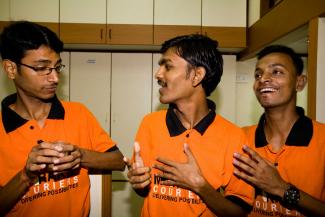
Mirakle Couriers is a National Award winning courier agency that employs low-income deaf adults. We speak to the founder Dhruv Lakra about his pioneering social-commercial enterprise.
Your enterprise, Mirakle Couriers, is business with a social purpose of providing employment to deaf individuals. What led you to you start this venture?
Mirakle Couriers was triggered by one particular incident I experienced while traveling on a bus in Mumbai. I was sitting next to a passenger who was anxiously craning himself looking out for his stop, despite the conductor’s loud announcement. I realized he was deaf and after exchanging a few notes, I helped him get out at the right stop. It was very small gesture, but it changed my outlook towards the deaf forever. I worked at Merrill Lynch investment banking for a few years. Dissatisfied I left the bank to work in rural Tamil Nadu. I wanted to explore the middle way between social work and conventional business that led me to the Skoll program for Social Entrepreneurship at Oxford. So, in a way, the foundation process for Mirakle had started much earlier.
What is the basic mission of Mirakle Couriers?
Our enterprise generates employment opportunities for low-income deaf men and women, and works to empower and help them achieve financial independence. Many of our employees have grown up in an over-protected environment or have been badly treated for being physically different. It is our belief that to overcome this we must bring out their true human potential. Mirakle Couriers does so by employing them in a highly competitive and professionally demanding courier business where we push them to rise to the occasion. Working with us they gain copious levels of confidence and eventually gain financial independence. The result is that many of them are able to go back home and support their families rather than having to be helplessly dependent on them.
So Mirakle Couriers is a prime example of social and commercial entrepreneurship?
We are not a charity but a social business, where the social element is embedded in the commercial operations. Our corporate clients have shown their trust in our business and our cause by availing our services.
What is the current strength of employees?
Mirakle started in 2009 with one delivery boy. Today we have 3 branches in the city, employing about 30 deaf employees and delivering over 25,000 shipments per month. Our back office is run by 3 hard working deaf women with learnt-by-doing knowledge in data entry and manipulation, tracking and scanning, sorting and other branch operations. On the field we have a team of 44 talented male deaf courier agents that navigate the complex lanes of Mumbai. They travel on public transport, avoiding traffic and remaining conscious of the environment.
How would you evaluate the job opportunity scenario for deaf people in the country?
Around 6% of Indians suffer from some form of hearing loss. 6% of 1.17 billion is over 10 million people. 66% of those are unemployed. That's over 6 million. (6,000,000.) Think about the immensity of that number. We at Mirakle Couriers see that number as a challenge - a challenge to which we are determined to rise. Since the day we began, when it was just me with an idea and our first deaf delivery boy Ganesh, we have propelled ourselves onward and upward on our will to do something about the dismal state of affairs for deaf people in this country.
Enterprises like yours provide optimism and opportunities for the deaf community. What would you consider your triumph?
Every day, in many small ways, we rise. Every day, we become better and better role models for the deaf community, fuller examples of success, and each time a new member joins our team, we rise, and the numbers against us—6%, 10 million, 66%, 6 million—fall.
What are the advantages of employing the deaf?
- We have noticed higher dedication levels.
- There is low employee attrition rate
- They are good with operations. They follow your instructions exactly.
And what are the challenges?
Our biggest challenge is trying to convince families to allow their adult members to work. Parents are conditioned to be overprotective and guarded.
Your pioneering initiative has been honoured with many awards.
We have won several awards including the 2009 Helen Keller award and the 2010 National Award for the Empowerment of People With Disabilities. Echoing Green Fellowship based in New York and many other.
What message would you like to convey as we celebrate the International Week for the Deaf?
I think we need to build more diversity and inclusion initiatives for the deaf at the workplace.






